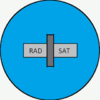RadSat: Difference between revisions
m (1 revision imported) |
Radictistan (talk | contribs) mNo edit summary |
||
| Line 2: | Line 2: | ||
| name = RadSat | | name = RadSat | ||
| logo = [[File:RadSatLogo.png|100px]] | | logo = [[File:RadSatLogo.png|100px]] | ||
| caption = | | caption = Corporate logo. | ||
| type = [[wp:Aktiengesellschaft|Aktiengesellschaft]] | | type = [[wp:Aktiengesellschaft|Aktiengesellschaft]] | ||
| traded_as = | | traded_as = | ||
Revision as of 02:34, 11 March 2019
 Corporate logo. | |
| Aktiengesellschaft | |
| Industry | Satellite communication |
| Headquarters | , Radictistan |
Key people | Pavle Hamsted CEO Mary Brittingham Chair of the supervisory board |
| Owner | Royal Radictistan Telecom (15%) Westlink (10%) Muller Capital (8%) SkyRad PLC 6%) |
| Website | http://www.radsat.co.rd |
RadSat AG is a Radictistani business consortium created to own and operate communications satellite packages for international broadcast and telecommunications servies. A fifteen percent stake in the consortium is owned by Royal Radictistan Telecom, the state-owned telecommunications company. The remaining majority stake is held by private investors. In addition to its owned-and-operated fleet of telecommunications satellites, RadSat also operates the RBSat constellation used for RBS backhaul within Radictistan itself. The satellites themselves are owned by the state broadcaster.
Satellites
RadSat owns and operates four geosynchronous satellites of the RadSat constellation. Three satellites of the RBSat constellation are owned by the Radictistan Broadcasting Service and operated on its behalf for the distribution of television signals between production and transmission sites. All seven satellites were built by Konavia Orbital, a subsidiary of the Radictistani aerospace company Konavia.
Geostationary orbit
Highly elliptical orbit
- RBSat-1
- RBSat-2
- RBSat-3
Services
Direct-broadcast satellite
RadSat-1, RadSat-3, and RadSat-4 each carry 28 Ku-band transponders with 36 MHz bandwidth and 12 C-band transponders also with 36 MHz of bandwidth for satellite television broadcasts using the DVB-S and DVB-S2 standards. RadSat-1 is stationed to serve the domestic Radictistani market while RadSat-3 and RadSat-4 are positioned over other regions. These satellites carry both free-to-air and encrypted channels.
Television backhaul
RadSat-2 provides television backhaul capacity for Radictistani broadcast syndication networks and transmits raw program feeds to local cable television headends. The RBSat constellation is used exclusively for relaying television feeds to the state broadcaster's national network of broadcast stations.
Telephony
RadSat 1, RadSat-2, RadSat-3, and RadSat-4 provide C-band intercontinental connectivity between switched telephone networks in Radictistan and elsewhere.
GMDSS
RadSat provides Global Maritime Distress and Safety System (GMDSS) functionality from RadSat-2 as a free public service. RadSat-2 monitors the 406 MHz emergency frequency used by emergency radiobeacons and automatically forwards detected distress transmissions to search-and-rescue authorities in Radictistan and other Apathian countries.
